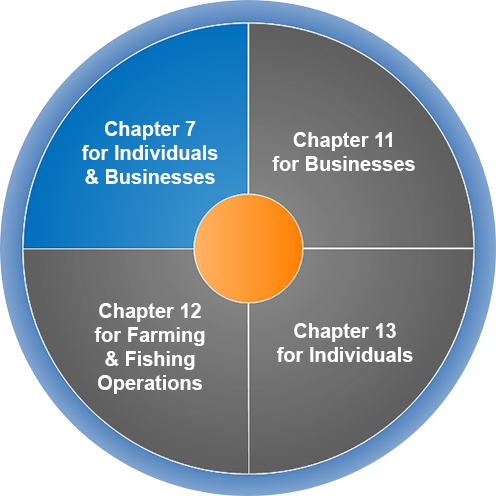What is Ch7?
Chapter 7 is a liquidation type of bankruptcy where, if successful, your assets are liquidated, and debts are discharged without you losing everything
Chapter 7 is a type of bankruptcy that is designed for individuals, corporations or other entities who are unable to pay their current debts and seek to discharge those debts.
The advantages of Chapter 7 usually include:
- Discharging your unsecured debt, such as credit cards, personal loans and deficiencies from foreclosed homes or repossessed cars.
- Stopping lawsuits and annoying calls from collection agencies
- Keep your home and cars, as long as you are current on your payments.
- Discharging old income tax debt
- Giving you a fresh start on your financial life within a few months
Who can file Ch7?
- Individuals, partnerships, and businesses are eligible to file for Chapter 7 bankruptcy.
- Before individuals can file for Chapter 7, they are required to go through a credit counseling process during which a debt repayment plan may be developed.
- If a successful payment plan is not developed during the credit counseling process, then you can go ahead with the bankruptcy filing.
- Partnerships and corporations considering bankruptcy under Chapter 7 must reorganize their debts.
How long does it take?
A Chapter 7 process usually takes 60-90 days after the initial meeting with the creditors. During this process your creditors are notified and given an opportunity to file proof of claims or objections. Usually, only a few claims and even fewer, if any, objections are filed.
What are the steps involved in Ch7?
Bankruptcy process is a complicated process involving many individuals with complex roles. It is best to consult an expert lawyer to determine whether this type of filing is right for you. Once you and your lawyer decide that it is the right filing, you need to file the documents listed in the “What documents will I need” section.
- File the petition in federal bankruptcy court (In Massachusetts they are located in Boston, Springfield, and Worcester)
- File other required documents
- Attend section 341 meeting
- Satisfy the means-test
- Comply with the judge’s instructions
What documents will I need?
In order to file for Chapter 7, you need to file a petition for bankruptcy in the federal bankruptcy court. In addition, you need to file the following documents:
- Statement of assets and liabilities
- Income and expense statement
- List of contracts, such as lease agreement
- Copy of the most recent tax return
- For individuals, proof of credit counseling and a payment plan if one was developed
Will I become debt free at the end of Ch7?
- If you are an individual, then in most cases you become debt free at the end of Chapter 7 bankruptcy process. In non-asset cases the process is easy because there are no assets to liquidate. In asset cases, unsecured creditors can file proof of claim and if the judge agrees with the claim they you may be responsible for a portion of the payment.
- If you are a partnership or corporation, then your debts will be reorganized, resized, and a payment plan will be determined so that you can pay off your creditors with an amount that you can afford and on a schedule that is comfortable.
How will Ch7 filing affect my credit?
Filing for bankruptcy can significantly affect your credit. Some of the consequences of filing for bankruptcy on your credit are:
- It remains on your record for 10 years
- It significantly reduces your credit score
- It becomes very difficult to obtain loans, credit cards, charge cards, or most types of financing
- It raises interests rates on any remaining or new financing if a lender wishes to continue or offer new financing
- It can result in cancelation of loans, credit cards, and financing
Ch7 FAQs
Will I lose my house in Chapter 7?
That depends. If you are current on your mortgage payments and have less than $500,000 (higher if you are a married senior) in equity in the house, you are not likely to lose your house in Chapter 7. As long as you remain current with your payments, except in rare circumstances, you should be able to keep your house. If you are behind on your mortgage payments, you may have to consider Chapter 13.
How about the rest of my belongings? Will I lose them?
In a Chapter 7, individuals are generally permitted to keep most of their belongings by taking advantage of the exemptions provided in bankruptcy. There are bankruptcy exemptions for clothing, furniture, cars, cash, jewelry, work tools, etc. Also, IRAs, 401(k) plans and other pensions are generally safe.
Can I reduce my mortgage or eliminate a second mortgage in Chapter 7? How about real estate attachments and executions?
A Chapter 7 will not affect the principal amount of any of your mortgages. If you have a second mortgage, you may be able to eliminate it in Chapter 13, but not in Chapter 7. However, you can remove real estate attachments or court executions on your home if they stand in the way of your homestead exemption.
